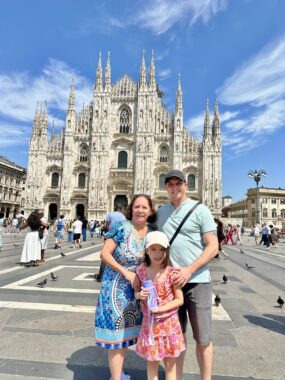We’re rethinking how we travel, thanks to our daughter’s progress
This summer, we chose a destination that would challenge us
Written by |

As parents of a child with aromatic l-amino acid decarboxylase (AADC) deficiency, travel has always required strategic planning and careful accommodations. From the earliest days of our daughter Rylae-Ann’s diagnosis at just 8 months old, my wife, Judy, and I learned to navigate the world differently. Every trip meant finding wheelchair-accessible transportation, calling ahead to ensure we had priority boarding, and leaning into the accessibility services offered by airlines, hotels, and tourist attractions.
These tools were essential — not luxuries, but lifelines that allowed our daughter to experience the world as freely as possible. But this summer was different.
Since undergoing gene therapy in Taiwan several years ago, Rylae-Ann has made incredible progress. Milestones we once feared were out of reach are now a part of our daily life. Her limbs move more freely, her speech flows with expression, and her laughter rings out with the confidence of a child discovering her strength. It’s a transformation we will never take for granted.
So, this year, Judy decided to rethink how we vacation.
The new journey of vacations
Instead of building the trip around accessibility, she carefully crafted an itinerary that would gently challenge Rylae-Ann’s new capabilities. Our destination? Italy is a country full of ancient streets, uneven stone paths, and limited modern accessibility in many regions. We knew it wouldn’t be easy. But Judy believed it would be worth it.
From the moment we arrived, Italy became a canvas for Rylae-Ann’s triumphs. She climbed cobbled staircases hand in hand with us, walked through bustling piazzas, and danced with joy in the shadow of the massive marble monuments. People passed us by and saw what they assumed was an ordinary family on vacation: a happy little girl bursting with energy, a couple savoring every moment, and a grandmother radiating love.
But behind that picture-perfect scene is a story of perseverance and healing.
Family healing

From left, Grandma Ann Hergenroether, Rylae-Ann Poulin, and Richard E. Poulin III pose for a family photo in front of the Duomo cathedral in Milan, Italy. (Courtesy of Richard E. Poulin III)
Joining us in Italy was Grandma Ann, still carrying the fresh pain of losing Grandpa Tim. His absence was deeply felt throughout the trip, but it was also in Italy that we rediscovered a sense of connection to him. Watching Grandma Ann and Rylae-Ann share gelato on a quiet bench or light a candle in a centuries-old cathedral reminded us that healing doesn’t come all at once. It’s layered in small, beautiful moments.
As much as we celebrated Rylae-Ann’s growth, we also used this trip as an opportunity to encourage continued development. We still carried backup gear when needed and accepted assistance when necessary. But we no longer automatically sought out every shortcut or priority service just because we could. Instead, we weighed each decision carefully, always asking, “Is this truly what she needs or what’s easier for us in the moment?”
It’s tempting, of course, to use every accommodation available. We’ve been there. We’ve stood at the front of the accessible queue. We’ve taken the front-row parking when it meant cutting minutes off a stressful outing. But we also recognize something else now: When we use those services without true necessity, we unintentionally dishonor the progress Rylae-Ann has fought so hard to achieve.
More importantly, we risk taking space from someone else who genuinely needs it.
Facing the reality
We’re not trying to pretend that Rylae-Ann doesn’t have challenges. She does. And we will never be ashamed of that. But we also believe in celebrating her abilities as much as we support her needs. Striking the balance between support and independence isn’t easy, but it’s where growth lives.
We know not every family is at the same stage in their journey. Some children with AADC deficiency still need full-time support and around-the-clock care. Some are waiting for access to treatments that could change their lives. We see you. We honor your travels. And we remember our early days, too, when even holding her head up felt like a miracle.
If there’s anything we’ve learned, it’s that progress doesn’t mean leaving behind the past. It means carrying it with you, allowing it to shape your gratitude, humility, and hope.
This summer, Italy gave us more than a family vacation. It provided us with a space to reflect, grow, and challenge all of us. It reminded us that even amid the ruins of ancient cities, new beginnings are always possible.
And perhaps most powerfully, it reaffirmed that we’re not just raising a daughter with a rare condition, but raising a girl who, against all odds, continues to redefine what’s possible.
Note: AADC News is strictly a news and information website about the disease. It does not provide medical advice, diagnosis, or treatment. This content is not intended to be a substitute for professional medical advice, diagnosis, or treatment. Always seek the advice of your physician or other qualified health provider with any questions you may have regarding a medical condition. Never disregard professional medical advice or delay in seeking it because of something you have read on this website. The opinions expressed in this column are not those of AADC News or its parent company, Bionews, and are intended to spark discussion about issues pertaining to aromatic l-amino acid decarboxylase deficiency.





Leave a comment
Fill in the required fields to post. Your email address will not be published.